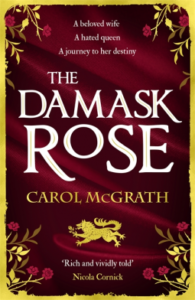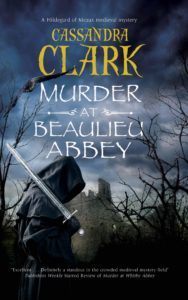Deborah Swift's Blog, page 17
May 10, 2021
An Excerpt from The Queen’s Rival by Anne O’Brien #HistoricalFiction
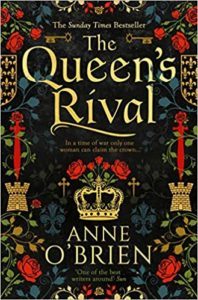 The Queen’s Rival by Anne O’ Brien
The Queen’s Rival by Anne O’ Brien
I’m delighted to feature this brilliant excerpt from Anne O’Brien’s new novel, The Queen’s Rival.
More about best-selling author Anne O’Brien can be found on her website, or chat to her on Twitter
BACK COVER COPY:
England, 1459.
One family united by blood. Torn apart by war…
The Wars of the Roses storm through the country, and Cecily Neville, Duchess of York, plots to topple the weak-minded King Henry VI from the throne.
But when the Yorkists are defeated at the battle of Ludford Bridge, Cecily’s family flee and abandon her to face a marauding Lancastrian army on her own.
Stripped of her lands and imprisoned in Tonbridge Castle, the Duchess begins to spin a web of deceit. One that will eventually lead to treason, to the fall of King Henry VI, and to her eldest son being crowned King Edward IV.
EXTRACT
Duchess Cecily’s intercession to the Blessed Virgin Mary
Hail Mary, full of Grace, Our Lord is with thee.
My faith is compromised. I kneel at your feet with the petition of any mother. Once again I fear for my son’s life, this time on some blood-drenched battlefield of the north.
Forgive the sad repetition of my prayers. You know the cruelty of men when they sent your son to his death. Protect Edward. Grant him victory. I am sleepless with despair.
Once again I watched my closest family ride out from London, bright with banners and confidence in their cause, whilst I was forced to accept that I might never see them again.
I cannot weep. My tears are frozen in fear.
Forgive my untruths, if such they were, in keeping the flame of Richard’s courage and leadership alive for his young son. I am certain it was the Neville betrayal that brought him to his death. That is what Diccon must believe. My lord Richard’s honour must be upheld for his sons, and I will do it.
Amen
England’s Chronicle, March 1461
It is said that York and Lancaster will face each other once again on a battlefield.
Is there no end to it?
Have we not suffered enough? It is said that the conflict will be at Towton, a village outside York that no one has ever heard of. If it occurs on Palm Sunday, when Christ rode into Jerusalem, what a terrible day that will be for both sides. The weather is not fit for battle. The Queen and her son, and Henry of Lancaster whom we may no longer call King, have taken refuge in York to await news. Here at Baynard’s Castle our Duchess Cecily will, hourly, be demanding couriers with news from her son Edward, the new but as yet uncrowned King.
Were you aware? Edward of York, soon to be crowned King if he returns with a victory in his hands, has instructed the illustrious Mayor and Aldermen of the City of London that in his absence it is his Lady Mother who is named by him as his representative? It is the Duchess who presides over our new king’s household. We swear she will do it with superb efficiency.
Such power for the lady who never wore the crown.
When will battle be? Who will come away with victory? White rose or red?
We wager it will be white. But who’s to know? We have been wrong before.
The Bishop of Elphin to Bishop Francesco Coppini of Terni, one-time Papal Legate
Written from Baynard’s Castle, Easter Monday 1461
Your Grace,
An event of some moment that may be to your advantage.
We had just heard Vespers. The Duchess has been fraught all day, and our spirits were low with lack of news from the north, although the Duchess’s demeanour was as always exemplary. She has marvellous self-control, even when racked with fear. Except when she dropped her Missal during the raising of the Host.
And then, after Vespers, her control deserted her completely.
The Lord Treasurer, waiting for us in the Great Hall, carried a letter to our blessed Duchess of York. She read the letter. Her face paled. Her hand trembled as she passed the misused Missal to me, her other hand clenched like a claw around the document. It had taken her naught but a moment to read the news, fair or foul. Her face was as white as the snow falling outside the window. Or as colourless as a death-mask. I might have thought there were tears on her cheeks, if I did not know her better.
I feared the worst and took her arm, offering my assistance in what I considered to be her overwhelming grief. She clung, fingers digging into my sleeve, but only for a fraction of time, before she turned on her heel, climbed the staircase to re-enter her chapel, beckoning for me and her two chaplains to follow. There she fell to her knees before the image of the Blessed Virgin and buried her face in her hands.
I did not know whether I should begin a Requiem Mass or start to sing a Te Deum, so silently distressed was the Duchess.
You will know the answer by now, I expect.
I imagine that you are praying hard for a Yorkist victory. The family is close to your heart and you will have your eye on the papal legate’s promotion again. You should also pray that your enemies (Queen Marguerite and France) do not speak out against you.
Elphin
England’s Chronicle, April 1461
The Battle of Towton was fought on Easter Eve.
The longest and bloodiest battle on English soil, the conflict bitter and vicious, repaying old scores.
Fought through a snow-storm, impossible to see friend from foe. The snow and Cock Brook ran red with blood.
How many lost? Hundreds. Nay, thousands. Enough to need mass graves where all were tumbled.
Who claimed the victory?
The House of York.
Anne, Dowager Duchess of Buckingham, to Katherine, Dowager Duchess of Norfolk
Written from the Palace of Westminster
My dear sister,
Do I mourn or do I rejoice?
I fear that Cecily will become unbearable in her pride for the achievements of her son. As if in imitation of the brave and noble heroes of old who fill my books, Ned has asserted his hold on England’s crown on the battlefield of Towton.
Cecily already acts the role of Dowager Queen. She has set about making preparations for the coronation. I wish you would come and give me strength to support it.
A Queen does not need to be crowned in order to rule, Cecily says if I dare to take her to task for her peremptory commands throughout her household.
I am pleased for her, of course, but I cannot help but remember my husband and son, dead on battlefields or in the aftermath. Nor can Cecily be cold to the onslaught of death on both sides. We have lost nephews in the terrible carnage at Towton. Lord John Neville and Henry Percy, Earl of Northumberland, add to the number of our family dead.
I feel wrung out with mourning.
Perhaps the outward jollity of a coronation will do us all some good!
Anne
Cecily, Dowager Duchess of York, to Edward, Duke of York, King in Waiting
Written from Baynard’s Castle
To my well-beloved son,
This is why I write to you.
I would commission you with a task before you leave the north.
Have the heads, those terrible mementoes of Wakefield, removed from Micklegate Bar. Have them carried to Pontefract to be reunited with those we love. It would be a double humiliation to leave them longer for public view and despoliation from time and weather.
You will be feted in York, of that I am certain. It is your task to tighten the bonds of friendship with this important northern base.
I will ensure that all is prepared for your return to London.
Your affectionate mother,
Cecily, Dowager Duchess of York
WANT TO READ MORE? BUY THE BOOK
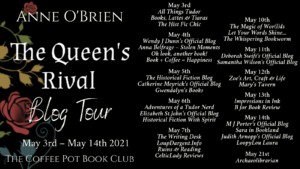
The post An Excerpt from The Queen’s Rival by Anne O’Brien #HistoricalFiction first appeared on Deborah Swift.
May 9, 2021
White Space in Historical Fiction
The reader’s reaction happens in the gaps.
I’ve just been reading a book about time. In it, we were encouraged to take a pause for a few seconds to allow a breathing space. Later that night I was reading a historical novel as my bedtime reading, and noticed that it had hardly any white space on my kindle. Also, the description butted right up to the speaker with no white space between. This novel was wearing to read, and the insertion of a little more white space in terms of paragraphing would have made it so much easier to digest. White space can convey what isn’t said in a scene. It is the subtle pause where something more can be read into the doaligue or the body language of your character.
The white spaces are the gaps where your reader ponders what will happen next. If there are no gaps, there are no spaces for the reader, and the effect is like force feeding. Allow the reader some time to digest and process by making enough white space. I sometimes use one sentence as a paragraph, if it’s important and needs space around it for the reader to think of the effects of the narrative on plot and character.
White can be black
I noticed too that white space can make a convenient ‘black-out’, to use a theatre term. The white space cuts us from one scene to the next. This is particularly useful in historical fiction when you don’t want to describe decades in which nothing new actually happens, but its necessary to show the passing of time. Transitions are often hard to achieve, but the white space does it effortlessly. It signals that we have switched to another time, location or point of view.
Sometimes when I’m drafting, if I don’t want to spend a long time researching the mode of transport (type of ship for passengers in 1630’s Italy for example, or what sort of carriage took you from London to Norwich in 1700) I’ll just type the words ‘Get them there’. Then I continue with the next pertinent scene. More often than not, the ‘Get them there’ can later be replaced with a white space – either a chapter ending or a page break.
This keeps the narrative moving forward and prevents endless journeys by carriage or horse, where nothing of any importance happens.
The shape of a page
Historical novels often need large amounts of world-building and these descriptions can seem impenetrable unless punctuated by white space. Think of your novel not just as words to be read, but as a visual picture that must be uncluttered and easy to digest. Balancing description with dialogue will supply you with some white space. If you send your book to your kindle or ereader and there are many pages with no white space or paragraph breaks on each page this is a sign that your book may be indigestible.
The post White Space in Historical Fiction first appeared on Deborah Swift.April 26, 2021
An interview with Keith Stuart – Pied Piper a #WW2 novel set in 1939
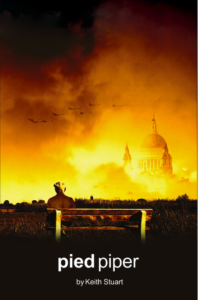
I’m delighted to welcome Keith Stuart to my blog today to tell me about his new book, Pied Piper.
Here’s the blurb:
In September 1939 the British Government launched Operation Pied Piper. To protect them from the perils of German bombing raids, in three days millions of city children were evacuated – separated from their parents.
This story tells of two families: one whose children leave London and the other which takes them in. We share the ups and downs of their lives, their dramas and tragedies, their stoicism and their optimism. But. unlike many other stories and images about this time, this one unfolds mainly through the eyes of Tom, the father whose children set off, to who knew where, with just a small case and gas mask to see them on their way.
Tell me about why you chose to write about WW2 and why this particular history?
I was born in 1952, just six years after the end of a second world war, three years after the end of war-time rationing and eleven years before conscription ended. !945 saw the end of a period of almost thirty years of conflict (albeit with a few years break), which had seen millions killed and atrocities on a scale the like which one can hardly comprehend. But it began a lifetime, for my generation, of relative peace and a period of change perhaps faster and more significant than many periods before or since.
This is a period of history which fascinates me.
The kernel for this first novel came from nothing more than a five minute ‘warm-up’ exercise one Monday morning at my writing class. We were asked to take ourselves, as it were, in a time machine, backwards or forwards. Without needing to think I went back to 1939 and the evacuation, to a story I feel has most often been told from the point of view of the mothers or the children themselves. What must it have been like for the fathers? Though many men had volunteered, conscription didn’t start until October 1940 – a year after the evacuation – and yet images of the times don’t show many men waving their children goodbye. I felt there was a story there, one which fitted with an interest I have in mental health and the changing definition of masculinity. An historical setting, the moving story of hundreds of thousands of children leaving their parents, and some fascinating, contemporary issues started to come together. And so, this first novel evolved.
What fact or feature about the evacuation did you find the most surprising or interesting?
When I researched to find exactly what parents were told, I found the words of the leaflets that were posted through letterboxes. It simply said that parents should deliver their children to the station from where they would set off to ‘somewhere’. It explained that parents would be told at some point where their children were, once they were settled. I struggle to comprehend what that must have felt like, to pack little children off with a case and a gas mask, with no knowledge of where they were going or who they were going to live with. For mothers it must have been heartbreaking but neither then nor now would anyone feel uncomfortable at the sight of a weeping, distraught mother. But how were fathers supposed to react at a time when men kept their emotions very much to themselves?
Interestingly, and I had not been aware of this previously, many of the children returned to the cities before the bombing raids began. Operation Pied Piper took place in September 1939 but the first bomb did not land on London until almost a year later.
What gave you the impetus to write your first novel?
In truth the impetus came from a few things aligning. I had always thought I had a novel in me – but who doesn’t – and retirement afforded me the time seriously to consider writing one. I had found it less easy to adjust to retirement than I had anticipated and joining a writing class filled some time. It gave me opportunities to write for the sake of it rather than as I had mainly done before, because I was required to for some purpose or another, and some positive feedback made me feel that perhaps I could string a sentence together. In fact, I knew I could do that, but it was encouraging to hear that some of those sentences touched others. I had no excuse and I came to realise I really wanted to write that novel.
In the process of writing this book, what craft aspects mattered to you the most as a novelist?
I was keen to capture the deep feelings of a man. I wanted to draw an ordinary man, dealing with extraordinary circumstances and get right inside him. I decided to write alternate chapters in the first and the third person. The chapters which featured the main character are written in the first person: the world, the events and their impact are seen from his viewpoint. It allowed me to get inside his head and take the reader there. I wanted the reader to empathise and sympathise with him, to share his love, anxiety, grief and determination.
The ‘other’ chapters written in the third person allowed me to sweep across several characters and create a contrast between the closeness I wanted with Tom and the slightly more distant relationship with the rest of the cast. Because the technique is consistent I didn’t need chapter headings to remind the reader of who they were getting the story from: early on in every chapter, just in case the reader hadn’t got the rhythm either ‘I’ or a name would act as a reminder.
What have you learned writing this novel that will help you writing the next?
I’ve learned that I enjoyed allowing the story to unfold and develop organically but that working like that is inherently risky. I wrote myself into a quite long-lasting cul de sac: I had to abandon ship or work it out and, I hope fortunately, I worked it out with a bit of research and some encouragement that what I had already had was worth concluding.
I learned that, no matter how many times you go over and over what you’ve written you might make the same mistakes you spot in other writers. It irritates me intensely when writers have their characters ‘ball their fists’ or ‘gun the engine’ over and over again. Hey ho, I found mine after it had gone to print but I’m not going to tell you what it is!
Have you another project (writing or non-writing related) that you are working on that you can share with us?
I am toying with the idea of taking my characters, as they are at the end of Pied Piper and casting them forward about ten years, to the end of the war, maybe to when I was born. It might be interesting to explore how the was has affected them all and how their lives shape up as they enter the post-war recovery and the social, musical, political explosions of 50s.
About Keith:
Keith Stuart (Wadsworth) taught English for 36 years in Hertfordshire schools, the county in which he was born and has lived most of his life. Married with two sons, sport, music and, especially when he retired after sixteen years as a headteacher, travel, have been his passions. Apart from his own reading, reading and guiding students in their writing; composing assemblies; writing reports, discussion and analysis papers, left him with a declared intention to write a book. Pied Piper is ‘it’. Starting life as a warm-up exercise at the Creative Writing Class he joined in Letchworth, it grew into this debut novel.
Chat with Keith on Twitter or Instagram @bykeithstuart @len_maynard
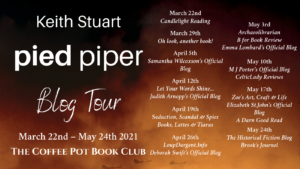 BUY THE BOOK, or read free on KINDLEUNLIMITED
BUY THE BOOK, or read free on KINDLEUNLIMITED
April 25, 2021
The Chinese Puzzle by J C Briggs – Review #Victorian #MurderMystery
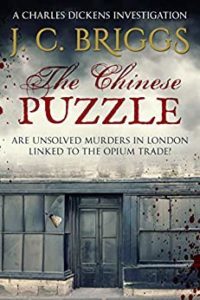 I have enjoyed several of J C Briggs books and I intend to catch up with them all eventually. This one centres around a mysterious Chinese Ambassador who appears at the opening of The Great Exhibition. At first the mystery is about tracing a missing person, a Chinese secretary assumed to be with the Ambassador, but one thing leads to another and it soon turns out another well-connected man has also gone missing. When his body is found in the Thames this leads into a murder investigation. The victim, Cornelius Mornay, a respectable banker, has links to Canton and the Opium trade, and the Opium trade and tea trade are threaded throughout this novel. The plot revolves around the man Mornay’s secret life in China, and the fact that his secrets come home to roost after his death.
I have enjoyed several of J C Briggs books and I intend to catch up with them all eventually. This one centres around a mysterious Chinese Ambassador who appears at the opening of The Great Exhibition. At first the mystery is about tracing a missing person, a Chinese secretary assumed to be with the Ambassador, but one thing leads to another and it soon turns out another well-connected man has also gone missing. When his body is found in the Thames this leads into a murder investigation. The victim, Cornelius Mornay, a respectable banker, has links to Canton and the Opium trade, and the Opium trade and tea trade are threaded throughout this novel. The plot revolves around the man Mornay’s secret life in China, and the fact that his secrets come home to roost after his death.
Who could fail to enjoy the opulence of the Crystal Palace and the Exhibition, with the carriages and royal attendants — contrasted with opium dens, dark alleys, filth and squalor, and shoe-black boys scrounging a living? What makes this series so enjoyable is the relationship between Charles Dickens and Superintendent Jones of Bow Street. By now they read each others moods and motives pretty well, and obviously have enormous respect for each others’ respective skills. What links them is their quest for decency and to bring murderers to justice, and this makes them characters the reader can warm to. Throughout we have threads from Dickens’ books woven into the narrative, and towards the end we get a glimpse of Dickens the actor, a nice touch, and it leads to a gripping ending.
This was an extensively researched novel, and there are notes at the back to tell you how the inspiration began with a newspaper article, and how the Chinese puzzle of the title might have been an actual object Dickens saw at the exhibition. This symbolic object was used to great effect through the novel.
As always with these books, the characters make it. We see the very rich and the very poor, those we can love and those we can loathe. Most loathsome I think for me was the self-satisfied Vicar Ernest Holiest, and Kitty ‘Puss’ Lovell. As always I love to see Scrap, the boy detective in action, this time felling a villain, and I felt immensely sorry for Kitty’s sister Maggie Chester.
If you love a great murder mystery and to immerse yourself in the sights, sounds and smells of Victorian London, then look no further, J C Briggs evokes the period brilliantly.
Highly recommended.
More about J C Briggs – J C Briggs Website
The post The Chinese Puzzle by J C Briggs – Review #Victorian #MurderMystery first appeared on Deborah Swift.April 9, 2021
The Damask Rose by Carol McGrath #medieval #SheWolfQueens #Review
“Edward, always Edward. He came first. He was her husband and her King.”
I have read all of Carol McGrath’s books and find them to be impeccably-researched and detailed evocations of the period. This one is no exception, and paints a vivid picture of Eleanor of Castile and life under feuding Barons and the ever-present threat of their insurrection.
Eleanor is an unlikely heroine when we first meet her, young, impressionable, and fiercely devoted to her husband. But while he is absent fighting to retain and regain his lands, she is left to literally hold the fort. She meets her match in Simon de Montfort and his sidekick the red-haired Gilbert de Clare who forcibly remove her from her home at Windsor castle and keep her under house arrest.
Eleanor’s companion, Olwen, a herbalist is the other main character who acts as go-between between those on the side of her husband, Lord Edward (soon to be Edward I ). Olwen’s skill in herbs allows Carol McGrath to give us sumptuous descriptions of the craze for Paradise Gardens, medieval herbs, and medicinal information about the period, all adding to the atmosphere of the book. Olwen is a good counterpoint to Eleanor, well-connected to all that is earthly, whereas Eleanor has a deep faith and feels connected to heaven via the idea of royal blood. Much of the book goes on in plots, whispers and messages, and Eleanor has to use diplomacy to keep her position and dignity. She realizes that owning her own estates not only gives her great security but also plenty of excuses to escape to her business with notaries and clerks, away from the stultifying demands of courtly life.
This portrait of her as she struggles through the death of her child and the struggles to remain a true queen make one realise why when she eventually dies she was so well-loved. This portrait of her early life gives an insight into what it took to be a great lady of the time and to deserve the title of ‘She-Wolf.’ A fascinating and detailed look into the life of a medieval Queen and very highly recommended by this reader.
To discover more about Carol McGrath, Visit Carol McGrath’s website.
The post The Damask Rose by Carol McGrath #medieval #SheWolfQueens #Review first appeared on Deborah Swift.April 8, 2021
Is your editor your servant or your master?
As an author whose books are set in the past, servants and masters often come up, and the idea of a hierarchy based on who pays who. (see this post) Also as an author I rely on my editors to help me make my book the best it can be. I love editors, and most authors will say the same – that a good one is like the holy grail!
I’ve been edited by an in-house editor at a traditional publisher, and by a freelance editor when I self published, and many others sorts of editors in-between. I’m interested not in individual editors, but in the status of the editor in relationship to the author, and therefore what dictates the relationship we might have with this most crucial of co-creators in our publishing journey.
My first relationship with an traditional publishing editor was very definitely one of collaborative effort to improve the book, and the editing was long, and comprehensive, over approx. 10 weeks, consisting of a structural edit, a line edit and a proofread, all done by different people. Each contained style sheets and references, and I got the impression from this that no expense was spared in making sure the book was as perfect as it could be. We had a back and forth dialogue which discussed character, plot and use of language. This was however, a long time ago, before digital, and times have changed.
Master or servant – it comes down to money
I was lucky, as I’ve just heard from a friend about her traditional publisher whose editor refused to let her book go to publication unless she agreed to the edits, which involved what she thought of as ‘too many substantial cuts’ and removal of one character and their arc completely. In the end, she acquiesced, but is now worried the book is no longer her vision, or the best version, of the work. In the traditional publishing model then, the editor can sometimes be ‘the master’. They are paying for the book to be published and are upholding what they view as certain ‘standards’.
On the other hand, when I was self-publishing one of my own books, I hired a freelance editor. His services were every bit as professional as the traditional publisher, and though it was a copy-edit not a structural edit, his edits included a style sheet and copious notes about what might make the book clearer or better for the reader. He also wrestled with my out-of-kilter timeline and suggested well thought-through corrections. My book had his attention for a specified amount of time, and I could quantify the time he spent because of his invoice. Because of his professionalism I have no doubt that if the book was too terrible to publish, he’d have told me … or would he?
And would they all?
The downside of this ‘author hires the editor’ relationship is that in this situation the editor is, technically, the servant. As I am paying for his services, it is unlikely he will tell me if my book is really bad and needs re-writing. Why? Because I’m paying him. There is a limit to what he can do in the time I’m willing to pay for, and my repeat business depends on me being happy. The power dynamic is distinctly different.
An author’s ego can be fragile, and it may be hard to ask for a ‘no holds barred’ edit, particularly if, after the harsh (but realistic) feedback arrives, you have to actually pay for the privilege to hear your book needs a lot more work.
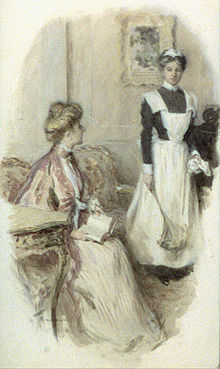
Illustration by William Thomas Smedley, 1906 Wikipedia
The computer is my editor
Recently I heard from another self-published friend who said that she was unhappy with her freelance editor. The editor seemed to have merely run her novel through a Pro-Writing Aid type program, and hadn’t given her work the personal attention she felt it deserved, at least not for what she was paying them. In this situation, she clearly thought of herself as the master, and that her servant had ‘cheated’ her and hadn’t done a good enough job.
Publishers don’t always have the best editors
Fast forward another few years. Newly-minted digital publishers (both independent and from big traditional houses) are pushing out books left right and centre. I had experience with one of these once that gave me no editing whatsoever, merely uploaded the manuscript to kindle and POD, which I then had to retrieve and re-edit (not my current publisher I hasten to add). Other people are telling me that their ‘editors’ have no editorial experience at all, but have merely have done an English Literature degree and ‘read a lot of books.’
A publisher’s editing costs are invisible to us as authors. We have no idea if the editor has spent a hastily-crammed few hours with the book, whilst dealing with twenty others, or sat with it for three weeks mulling over every last word. Though there are often clues in the ‘track changes’, that show the book was edited in less time than it takes to brew a coffee! And I suspect most authors can tell if they have been given less time with the editing than they would wish.
It’s our choice
There are brilliant, insightful editors out there, both in-house in publishing houses, and working freelance for self-publishers. As authors I think we should always consider what sort of status relationship we want with our editor and how much that matters to us, when we consider the bigger picture and the pros and cons of our publishing journey. The quality of editing really affects the final outcome of what has taken us perhaps as long as a year of daily grind to write. As authors we all hope for an editor that will take our voice seriously, that will read and consider our novel carefully, and one who is fully qualified for the job.
Authors are often in a vulnerable or ambiguous position re their books (e.g. Do you choose your agent or do they choose you?) but now we can pay for our own services, or choose to be published, we don’t need to be blind to our choices. Although we always hope for equality, and the situation where author and editor work together to produce the best book they can, we need to be aware of how different publishing structures affect the author/editor relationship.
The post Is your editor your servant or your master? first appeared on Deborah Swift.April 6, 2021
Hotel Obscure – short stories by Lisette Brodey #GreatReads #TuesdayBlogs
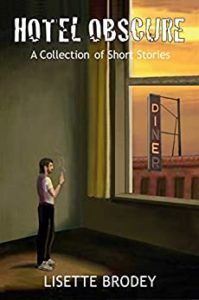
Every now and then I feel like reading something different . Hotel Obscure is about as far away as you can get from my current life as a comfortably-off, middle aged (if not old!) woman in a small quiet village in Northern England. Hotel Obscure of the title is an American hotel populated by the dispossessed, by hookers, drug dealers, failed rock stars and general low-life. It’s the sort of place people go to hide, or to die, and in this collection the characters do both!
The stories in the book are linked by the place in one way or another and some of the stories intersect in surprising ways. What I really enjoyed about these stories were the characters, who never failed to engage the reader with their hardships and stories of the wrong side of the tracks.. Each story often had a sting in the tail – I particularly enjoyed ‘Requiescat in Pace’ which had a marvellous twist at the end, ‘Not that Lonely’ was a great slice of life showing how connected even the most dysfunctional people are, and dealing with death in a really matter of fact way. Many of the stories have the threat of death lurking beneath like a thread. I loved the ageing Gloria in her overly colourful clothing and Margaret in her ‘fire-engine red’ stilettos and Johnny and Henry and their uneasy comradeship based on proximity of place rather than common interest. Toleration of others is a heart-warming strength of these characters.
Lisette Brodey has a way of getting under people’s skin and noticing how they think and what makes them unique. In the last story, Ellmore J Badget Jr is so repressed and strait-laced that he finds even the thought of adjusting his tie, once his day has started, makes him queasy. Nevertheless I warmed to him and was rooting for this son of a judge who was always a disappointment to his father. Being a disappointment is a theme that recurs in many of the stories, the sense of just having missed the destiny of greatness, or of feeling that you cease to matter to the world. What becomes apparent from the story is that everyone does. The stories are poignant and gripping and I highly recommend Hotel Obscure.
Reader Note: contains expletives and sexual references in keeping with the subject matter
The post Hotel Obscure – short stories by Lisette Brodey #GreatReads #TuesdayBlogs first appeared on Deborah Swift.March 30, 2021
Murder at Beaulieu Abbey by Cassandra Clark is out today! #MurderMystery
I’m delighted to spotlight the new Abbess of Meaux murder mystery by Cassandra Clark on it’s publication day!
From Cassandra: I am now writing the Abbess of Meaux series of historical mystery novels set in fourteenth century Europe. I’m pleased to be able to draw on travels in France and Tuscany and bring together my interests in music, politics and history.
The first in the Abbess of Meaux series was published in 2008. Followed by The Red Velvet Turnshoe a year later when Hildegard crossed the Alps. She was back home in York for The Law of angels and the following year off down to Westminster with Alexander Neville’s cavalcade to see King Richard open parliament. Meanwhile she fell for a London bad boy involved in the spying game for which she had to go on a penitential pilgrimage to Santiago de Compostela.
Back in Yorkshire she stays at the sinister priory in Handale Woods – a horrific dragon and the mutilated body of a young mason are a mystery that puts Hildegard’s life in jeopardy once again.
Next, with dark forces building around King Richard, the Prioress has a special assignment for Hildegard. She must go to the pope’s palace at Avignon in the south of France to find out whether he will give his support to the King or to his ambitious and deadly uncle, the duke of Gloucester … But the pope himself has a terrifying secret and Hildegard is the only one who can put all the pieces of the puzzle into place.
Click here to read an interview with Cassandra Clark at bfkbooks.com
Now follow Hildegard of Meaux into the dark side of medieval England in book 11 when a request to escort a young heiress to the north becomes a sinister game of cat and mouse.
‘Hildegard is..a cross between Brother Cadfael and Miss Marple…surely a great addition to the sleuthing fraternity.’
(Docklands)
Death and danger await intrepid nun Hildegard of Meaux when she undertakes a secret mission for the good of her Order, in this eleventh action-packed installment of the medieval mystery series.
February, 1390. The Church seethes with rebellion. Newly elected Pope Boniface faces a challenger: the anti-pope Clement, who sows discord from his power base in France.
The quarrel threatens the very survival of the Cistercian Order. So when suspicions grow that distant Beaulieu Abbey may turn traitor, Hildegard’s prioress summons her with a mission she can’t refuse: travel to the isolated royal abbey and spy out their true allegiance.
The public reason for Hildegard’s trip is more prosaic. A young Cornish heiress, promised in marriage to the son of local aristocrat Sir William, needs escorting to her new home. It’s not often Hildegard joins a betrothal party, and she’s looking forward to meeting the girl.
But little does Hildegard know, death and danger wait at Beaulieu – and even the protection of her travelling companions, the monks militant Brother Gregory and Brother Egbert, may not be enough to keep her safe from harm . . .
This action-packed, page-turning medieval mystery is a great choice for fans of holy sleuths like Peter Tremayne’s Sister Fidelma and Paul Doherty’s Brother Athelstan.
Buy MURDER AT BEAULIEU ABBEY on Amazon UK
Buy MURDER AT BEAULIEU ABBEY on Amazon US
See all eleven books in the series Visit Cassandra Clark’s website
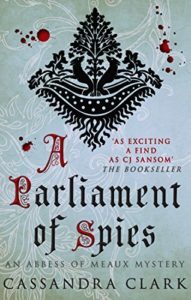
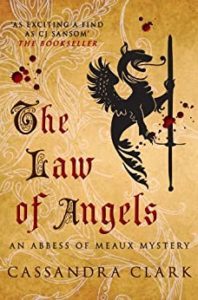
March 22, 2021
Courting Danger by J G Harlond #WW2 #MurderMystery
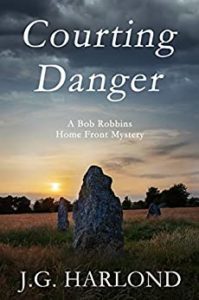 I’ve read both the other books in this series so was really looking forward to this third book. And its an absolute cracker. When the local doctor is found semi-submerged in a pond associated with the Old Gods – Gogmagog Ditch, Bob Robbins and his sidekick Laurie Oliver are brought in to investigate. Initially labelled as a suicide, the doctor’s death is soon discovered to be the result of bludgeoning about the head and so the sleuthing begins. There’s a large cast of interesting characters, and it soon turns out the doctor is not as clean-living as we might expect and a veritable Lothario, and several of his women friends are possible suspects.
I’ve read both the other books in this series so was really looking forward to this third book. And its an absolute cracker. When the local doctor is found semi-submerged in a pond associated with the Old Gods – Gogmagog Ditch, Bob Robbins and his sidekick Laurie Oliver are brought in to investigate. Initially labelled as a suicide, the doctor’s death is soon discovered to be the result of bludgeoning about the head and so the sleuthing begins. There’s a large cast of interesting characters, and it soon turns out the doctor is not as clean-living as we might expect and a veritable Lothario, and several of his women friends are possible suspects.
I enjoyed taking a trIp to the standing stones and old caves of Cornwall, to Willoughby’s antiquarian bookshop (which I have to admit I could probably have happily lingered in for a few hours in real life), to the racing stables staffed with the cold fiancee Daphne and sunny Pippa. There are some wonderful eccentrics, including the Hilda, the manipulative and bullying sister of Gwen, an invalid, and Muriel Kittoe the author of murder mysteries.
Bob Robbins is a great character to get to know, and I enjoy the way he still talks to his now deceased wife, Joan, which is both poignant and realistic. Laurie Oliver, the younger policeman, who knows all sorts about literature and is apt to quote it to the consternation of his boss, is delightful, and keeps Bob on his toes. Add to the interesting characters a plot involving drugs, old rituals, stolen goods, army manoeuvres and an attempt to send someone crazy, and you have all the ingredients you need for great entertainment and a great read.
You can buy the book here US UK
Find Jane on her website
Read my Review of Private Lives
The post Courting Danger by J G Harlond #WW2 #MurderMystery first appeared on Deborah Swift.March 18, 2021
Historical Fiction – Info-dumps and how to ditch them #amwriting #HistFic
Readers of historical fiction love complex world-building, but only when it is integral to the story.
How do I tell if I’ve written an info-dump?
Nothing within the info dump is occurring in the actual moment of the scene. Often they are regurgitations of the past (back story) or they convey historical facts about the characters or era. Readers want to be immersed in the story. They want to feel like they are right there with the character as the characters drive the narrative. Info dumps also lack emotional impact as they tend to be information-heavy, and so they often fail to make connection with the reader.
Q.Is anything I’ve written in this paragraph happening right now
A. No? Cut it.
The most common things to info-dump in historical novels are:
*How the politics/society works.
*Character back story – what they did before the story began.
*Character front story— what they intend do in the future (unless it’s an active threat, or plot-driving intention).
*Character journeys – detailing the horse, carriage, boat, route.
*Rules, rituals or laws of a city/country/culture
*Historical or cultural objects that need explaining eg types of carriages, wet-nurses, styles of Roman column
*’How to’ paragraphs: explanations of how to load a gun, victual a ship, shoe a horse, (unless it is in the moment)
*Personality summaries – eg ‘John was a…’ Readers want to discover these traits for themselves through the characters’ actions and speech.
Q. Does it matter to the story?
A.Well, the story wouldn’t be as rich without all this detail.
Q. How much detail do you really need?
A. OK, OK. I’ll cut some of it.
How to insert information skilfully:
Brevity. One sentence, you can usually get away with.
Sprinkle. Tell the minimum amount people need to know and sprinkle it through a scene.
Dialogue: Unless the character is unfamiliar with his own world, they will never have to explain it to anyone. (Let alone the reader). Use dialogue only between a person who needs to know the information and the character who needs to tell it.
Character attitude. Use it as a person’s opinion. “Red suits my colouring. I hate the foolish sumptuary law that stops me having a gown the same colour as hers.”
Integration. Fit it into the scene as much as possible and align it to something that is happening NOW.
A separate extract. Careful here, but a distinct change to a newspaper article, letter, extract of a diary could be used for this purpose.
Of course these are not hard and fast rules; if you’re using a characterful omniscient POV, or a first person POV with attitude, you can get away with giving us a fair amount of information, or if your tone is supposed to be amusing, such as in Markus Zusak’s The Book Thief, below:
Here is a small fact: You are going to die. I am in all truthfulness attempting to be cheerful about this whole topic, though most people find themselves hindered in believing me, no matter my protestations. Please trust me.
Historical Picture note, about John Hunt Gong Farmer
Gong farmer – a term that entered use in Tudor and early Modern England to describe someone who dug out and removed human waste and excrement from privies and latrines. The word “gong” was used for both the privy itself and the crap (!) that was in it. Work like this was deemed unclean in polite society and so they were only allowed to work at night. The waste they collected was also known as night soil, and they were often also referred to as nightsoil men.
Writers: You might also like: Why have a historical Sub-plot?
The post Historical Fiction – Info-dumps and how to ditch them #amwriting #HistFic first appeared on Deborah Swift.
